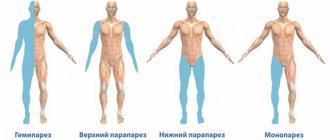- Home >
- Symptoms >
- Weakness throughout the body
Each of us at least once in our lives experienced an unpleasant feeling of weakness throughout the body. Most people do not attach any importance to this symptom, because almost all diseases in the body occur with weakness, malaise, and loss of performance. However, in some cases, it is weakness in the body that is the first alarming symptom, when it is not too late to do something, get examined and treated. Let's deal with this insidious symptom.
At a consultation with a neurologist:
- Conducts an inspection;
- Listens to patient complaints;
- Make a preliminary diagnosis;
- If necessary, he will refer you for additional studies, which can be completed in our center;
- will prescribe an individual course of treatment.
Nervous system diseases
| Main symptom | Additional symptoms |
| Weakness throughout the body |
|
Content:
- Clinical signs of low glucose levels
- Causes of low blood sugar
- Hypoglycemia in newborns
- Hypoglycemia in a healthy person
Hypoglycemia - low blood sugar. Symptoms develop gradually, over 20-60 minutes. It occurs mainly in people suffering from type I diabetes mellitus (insulin dependent) when the rules of replacement therapy are violated. Sometimes occurs in pregnant women or newborn children. The minimum acceptable blood glucose level is 3.3 mmol/l. With decompensated diabetes, symptoms of a drop in blood sugar in a person occur already at 4.5 mmol/l. In the most severe cases, hypoglycemia can occur at 6-7 mmol/l.
Obstetric conditions and gynecological diseases
| Main symptom | Additional symptoms |
| Weakness throughout the body |
|
Diagnostics
The primary examination is carried out by a general practitioner. The initial diagnostic stage consists of a detailed collection of all complaints, a history of the development of the disease, on the basis of which the presence of a certain pathology or risk factor is assumed. Then, based on the complaints, special laboratory and instrumental methods are prescribed that make it possible to confirm the probable causes of weakness. The most informative ones are:
- Neurological examination
. To study the functioning of the nervous system, cognitive functions are examined, and the time of occurrence of dermographism is measured. Specific tests (orthostatic and Danini-Aschner) reveal discoordination of sympathetic and parasympathetic regulation. The functional activity of the brain is clarified using EEG. - Blood tests
. A general blood test determines leukocytosis, hemoglobin and red blood cell levels. A biochemical study is carried out to assess liver function, detect signs of inflammation or residual electrolyte disturbances. The content of free T3 and T4 in the blood must be taken into account, and a fasting glucose test is done. - Coprogram
. If weakness occurs after symptoms of poisoning, it is necessary to do a microscopic examination of the stool and culture the material on nutrient media to detect pathogenic microorganisms. In case of prolonged dyspepsia for no apparent reason and malabsorption syndrome, stool is examined for the level of fecal elastase and specific antigen H. pylori. - Ultrasound examination
. If there are complaints from the digestive system, a survey ultrasound of the abdominal organs and retroperitoneal space is performed. In women, the pelvic organs are additionally visualized. If there are signs of a pathological process, more informative examinations are recommended - endoscopy, radiography of the intestine using a contrast agent. - ECG
. In middle-aged and elderly patients, an electrocardiogram must be recorded in standard leads and with a load. For a detailed examination of the heart, 24-hour Holter monitoring is effective. To examine the anatomical features of the heart and identify signs of valve damage, echocardiography with vascular Dopplerography is performed. - Additional methods
. To study the respiratory system, a chest x-ray is taken. Spirography helps to assess the function of external respiration. If weakness is caused by a lack of thyroid hormones, scintigraphy of the thyroid gland with iodine is indicated to diagnose organic damage. MRI and CT scan of the brain will help rule out inflammation and degenerative changes.
Endocrinological diseases
| Main symptom | Additional symptoms |
| Weakness throughout the body |
|
Causes of weakness
Wrong daily routine
Natural reasons that cause weakness are non-compliance with the daily routine, working seven days a week for 10-12 hours a day. Malaise is more often observed in middle-aged and older people, whose body is more difficult to adapt to overload. Fatigue occurs in the late afternoon after a hard day of work: general weakness, drowsiness, and heaviness in the muscles of the legs and arms appear. The condition is aggravated by a lack of sleep at night, in which case discomfort and powerlessness persist even in the morning. Similar symptoms occur in people who have to work night shifts.
Dehydration
With a lack of fluid, the work of the heart muscle is disrupted, vascular tone changes, blood circulation in the brain worsens, which is why general malaise develops. Fluid loss of up to 5% of body weight only slightly worsens the general condition: dry mouth, weakness in the legs, and poor exercise tolerance. Massive dehydration is caused by pathological causes: bleeding, generalized hyperhidrosis. In this case, weakness, dizziness and darkening of the eyes are observed; in the most severe cases, the patient cannot move his arms and legs.
Avitaminosis
For coordinated work, the body needs all microelements and vitamins, and the first sign of vitamin deficiency is nonspecific malaise. Most often, symptoms are caused by a lack of vitamin B12, which is involved in the process of hematopoiesis. With hypovitaminosis B12, there is severe weakness, intolerance to physical labor, typically flashing “spots” before the eyes and frequent dizziness. The patient's appearance changes: the skin becomes pale, the tongue becomes bright red, shiny, the nasolabial triangle turns blue.
With vitamin D deficiency, severe weakness in the muscles predominantly develops; muscle tremors appear when trying to play sports or even walk quickly. This cause of malaise is characterized by increased symptoms in the autumn-winter period, when daylight hours are short, and the production of cholecalciferol in the skin under the influence of ultraviolet radiation does not cover the body's needs for the vitamin. Fatigue and powerlessness are accompanied by body aches and joint pain. If you have such signs, you should visit a doctor.
Poisoning
After diarrhea and vomiting stop, toxic compounds circulate in the bloodstream, which are normally eliminated through the gastrointestinal tract. Weakness after poisoning lasts from several days to a week, since the harmful substances remaining in the body are eliminated extremely slowly. Nonspecific symptoms are observed, it is difficult for a person to perform usual work, and fatigue occurs after physical exertion. Characterized by dizziness and dull pressing pain in the head. If you are unable to recover from poisoning within a week, you should consult a doctor.
Allergy
In systemic allergic reactions to food, pollen or animal dander, large amounts of histamine and other active substances are released into the bloodstream. They affect the walls of blood vessels, causing a sharp drop in blood pressure, which is manifested by sudden weakness up to short-term fainting. Mild discomfort persists throughout the duration of the allergen's action; the symptom is often combined with rhinitis, lacrimation, and sore throat.
Vegetative-vascular disorders
The clinical picture of VSD is more common in young people in whom the processes of autonomic nervous regulation are not sufficiently balanced. The appearance of weakness is associated with disturbances in the interaction between the central nervous system and peripheral nerves, decreased vascular tone and circulatory pathology. Fatigue and malaise intensify under the influence of stress, poor nutrition, and physical fatigue. Characterized by periodic dizziness, attacks of weakness in the legs, hyperhidrosis, and presyncope.
Diseases of the cardiovascular system
Causes from the heart cause a decrease in effective blood flow and a lack of oxygen in the most important internal organs. There is severe weakness, which is aggravated by physical activity. Worried about severe shortness of breath, interruptions in cardiac output. A similar condition in combination with high body temperature is observed in myocarditis and endocarditis. If, against the background of severe weakness, compressive pain in the heart appears with radiation to the arm, it is necessary to exclude an attack of angina pectoris or an incipient myocardial infarction.
Endocrine pathology
A feeling of weakness in the muscles, when everything literally “falls out of hand,” is characteristic of hypothyroidism. With a lack of thyroid hormones, the basal metabolism slows down, the mental and emotional state is disturbed, which is manifested by depression and apathy for no apparent reason. Malaise accompanied by severe headaches, thirst and polyuria indicates the development of diabetes mellitus. Severe weakness with muscle tremors and attacks of aggression is one of the signs of hypoglycemia caused by improper selection of insulin therapy.
Liver diseases
Asthenovegetative syndrome is the first manifestation of any liver pathology. Symptoms increase gradually, first appearing increased fatigue after a working day, making it difficult to concentrate and think. Then weakness persists constantly, patients refuse their usual physical activity or sports. When walking quickly or with minor exertion, shortness of breath and dizziness bother you. The reasons that cause such a clinical picture:
- Hepatitis
: viral, toxic, autoimmune. - Infiltrative processes
: fatty liver, glycogenosis, amyloidosis. - Vascular damage
: portal hypertension, hepatic vein thrombosis, pylephlebitis. - Hepatobiliary diseases
: cholangitis, bile duct strictures, cholestasis of pregnancy.
Gastrointestinal diseases
During inflammatory or dystrophic processes, the intestinal microflora is disrupted, as a result of which a large amount of harmful substances accumulates in the body, causing endogenous intoxication. The situation is aggravated due to insufficient absorption of beneficial food components in the small intestine. Patients feel constant severe weakness, heaviness in their arms and legs, and it becomes difficult for them to cope with their usual work. I am worried about periodic pressing headaches and dizziness, nausea, and lack of appetite. The main gastroenterological causes of weakness:
- Chronic inflammation
: hypoacid gastritis, duodenitis, enteritis. - Functional disorders
: esophageal dyskinesia, dyspepsia, irritable bowel syndrome. - Malabsorption syndrome
.
Depression
A depressive state is characterized by a variety of complaints: fatigue and weakness, constant muscle weakness up to the inability to move an arm or leg, loss of interest in work and hobbies. In difficult situations, a person lies motionless on the bed all day long, sleeping 14-16 hours a day. Often, weakness due to depression is accompanied by somatic disorders: lack of appetite, constipation, diffuse headaches and abdominal discomfort. Increased discomfort occurs after stress, conflicts with relatives or friends.
Neurological problems
Disorders of the peripheral nerves (plexitis, neuritis, polyneuropathy) cause severe weakness in individual muscle groups or in the entire limb. At the same time, active movements are significantly limited, while passive movements remain normal. If peripheral neuropathies are combined with disorders in the central nervous system, general malaise, apathy, frequent dizziness and darkening of the eyes are observed. Along with subjective symptoms, a slight tremor is felt in the affected muscles, the skin over them turns pale and thins.
Tumors
All oncological causes cause severe intoxication of the body with the decay products of cancer cells, to which brain structures and internal organs react acutely. Patients feel extreme weakness and fatigue not associated with physical activity. The malaise does not disappear even after a long night's sleep; on the contrary, in the morning I am bothered by weakness and headaches. Cancer intoxication leads to loss of appetite, aches throughout the body, and prolonged low-grade fever. Symptoms persist for several months.
Complications of pharmacotherapy
Most often, weakness develops after the use of psychotropic drugs - sedatives, tranquilizers and antipsychotics. The drugs selectively inhibit the functioning of brain structures, increase the threshold of excitability of neurons, as a result of which malaise is accompanied by indifference to what is happening around. Symptoms also occur with the use of antihypertensive drugs, especially beta blockers. Weakness is caused by a decrease in cardiac output and changes in the circulation of vital organs.
Rare causes
- Kidney diseases
: chronic glomerulonephritis and pyelonephritis, initial stage of renal failure. - Postoperative period
. - Brain damage
: severe head injury, meningitis and encephalitis, degenerative processes (Pick's disease, dyscirculatory encephalopathy). - Respiratory tract diseases
: COPD, bronchial asthma, pneumonia in the period of convalescence.
Infectious diseases
| Main symptom | Additional symptoms |
| Weakness throughout the body |
|
Causes of low blood sugar
The most common reason for low blood glucose is not eating after an insulin injection.
in patients suffering from diabetes mellitus. Such cases account for about 90% of all episodes of diagnosed hypoglycemia. The hormone, entering the bloodstream, promotes the breakdown and absorption of carbohydrates by tissues. At the same time, their plasma level decreases critically. Signs of pathology occur when there is a sharp drop in sugar levels from high numbers to low or normal levels for a healthy person (for example, from 18-19 to 5-6 mmol/l in diabetics).
Other possible causes of a sharp drop in blood sugar in patients with diabetes include:
- Administration of an excessive dose of insulin
. Occurs when the doctor selects the wrong dosage or makes mistakes when putting the drug into the syringe. It occurs mainly in people who have recently started a course of replacement therapy. The severity of the pathology directly depends on how much the required dose of the medicine was exceeded. - Increased physical activity
. During physical work, the body spends energy, which is replenished through the breakdown of carbohydrates. If a dose of insulin is administered and a person then begins to exercise or work, mild to moderate hypoglycemia may develop. - Drinking alcohol
. Regular consumption of alcoholic beverages leads to disruption of carbohydrate metabolism in the liver. The organ is unable to synthesize glucose from proteins and maintain its required level in the internal environment. This is one of the common causes of low blood sugar in men.
Hypoglycemia in newborns
Reasons for low blood sugar in children in the early stages of life:
- newborn syndrome from a mother suffering from classic or gestational diabetes;
- DM of newborns;
- iatrogenic neonatal hypoglycemia;
- other transient and unspecified disorders of carbohydrate metabolism.
Such disorders are due to the peculiarities of the production and consumption of sugars by the child’s body. Glucose consumption in the early postnatal period is about 7 g/kg body weight per day. Insufficient intake provokes activation of the processes of glycogenolysis and glucogenesis, which in the future can have unpredictable consequences.
Hypoglycemia in a healthy person
Sometimes blood sugar drops in pregnant women. This is due to hormonal changes in the body, which causes hyperproduction of insulin by the pancreas. In addition, malnutrition may be the cause of low blood sugar in a woman. The fetus consumes quite a large amount of glucose. If consumption is not compensated by food, the concentration of sugars in the internal environment decreases.
In people without diabetes, the cause of hypoglycemia is insulinoma, a hormone-producing tumor of the pancreas. At the same time, the concentration of insulin in the body increases, the content of sugars decreases. Sometimes a drop in glucose levels occurs during extreme fasting, when the body is unable to compensate for the lack of carbohydrates from internal reserves.









